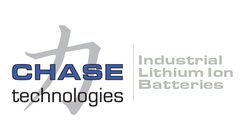Lithium iron phosphate versus traditional lead acid battery systems
| Lithium iron phosphate versus traditional lead acid battery systems_approved | 38 KB | Download | |
| CHASE Technologies supplies LiFePO4 batteries for materials-handling forklifts | 492.55 KB | Download | |
| LiFePO4 represents the most advanced battery technology available today | 637.88 KB | Download | |
| CHASE Technologies also supplies related equipment such as battery chargers | 420.44 KB | Download | |
| CHASE Technologies has a distribution agreement with a leading global heavy-duty LiFePO4 battery maker | 354.31 KB | Download |
This is according to CHASE Technologies General Manager Brent Fraser. CHASE, an acronym for ‘Chemical and Solar Energy Technologies’, is a specialist provider of LiFePO4 battery systems for forklifts in materials-handling applications, in addition to battery-operated heavy equipment such as cleaning equipment and access platforms.
“We have an exclusive distribution agreement with the highest-volume producer of heavy-duty LiFePO4 batteries globally,” Fraser reveals. These range from small 25.6V 135Ah units, right up to larger 80V 700Ah units. Unlike Pb batteries, LiFePO4 batteries from CHASE Technologies have a full five-year guarantee, which means no unanticipated cell replacements during the contract period.
Even when LiFePO4 batteries do fall below the efficient operating nominal capacity of 65%, they can still be used in lighter-duty forklift applications or retained as storage batteries, adding value long after the warranty itself has expired.
LiFePO4 batteries are sealed units that do not require topping up of electrolyte or periodic acid adjustment, and no equalisation charge or cooling periods are required. “You simply charge, plug in and you’re good to go,” Fraser highlights.
Representing the most advanced battery technology available at present, LiFePO4 is also environment-friendly. It reduces heavy metal pollution as it is produced without any cadmium, lead or mercury. “Reduced energy consumptions means less electricity required, and therefore reduced carbon footprint from our coal-dominated electricity supply grid,” Fraser points out.
The energy density of LiFePO4 is about 140 Wh/kg or three times that of Pb batteries. In comparison, LiFePO4 is only around 33% of the volume and 25% of the weight of Pb batteries. This means much higher-capacity batteries can be used in the same compartment, with greater configuration flexibility.
A LiFePO4 battery-powered vehicle can travel 1.35 times longer or further than the same vehicle fitted with a similar capacity Pb battery. During charge and discharge, the energy-conversion efficiency of the former is about 98%, compared to a maximum of 85% efficiency for Pb, translating into a significant 15% electricity saving.
Due to their chemical composition, LiFePO4 batteries are also the safest and most stable of all lithium ion (Li-ion) batteries. Li-ion batteries also do not emit any harmful acidic gases and hydrogen during charging, as do Pb batteries, which poses a major health and safety risk. In addition, the absence of any sulphuric acid based electrolyte eliminates corrosion and reduces the premature failure of cables, connectors and battery tanks.
With the appropriate ultra-fast chargers from CHASE, a Li-Ion battery can absorb 50% of its capacity from a boost charge time of just 30 minutes. Full charge can be achieved in 60 to 120 minutes, dependent on the charger capacity. Rapid and opportunity charging ensures 24/7 availability.
Full charge does not need to occur in one continuous charge, but is equally effective with compound brief charges during breaks. There is no memory effect, which means opportunity charging is ideal for heavy-duty working conditions in long and multiple shifts. Ultra-charging, in turn, eliminates the need for multiple batteries and battery changeovers, as batteries can be boost charged during breaks or idle times. This reduces the risk of any accidents during battery changeovers and eliminates the need for battery bays with forced ventilation and battery attendants, saving money and freeing up valuable space.
CHASE Technologies caters for most customer requirements in the forklift segment. Its all-aluminium casings, inserted in heavy-duty mild steel tanks, are manufactured especially at its Alrode South, Johannesburg facility for extra durability and robustness. These can also be customised for specific customer requirements.
In addition, each battery comes with an integrated battery monitoring system (BMS) that safely manages the charge and discharge of the battery, while ensuring maximum possible lifespan. Another key differentiator is that CHASE Technologies has a comprehensive stockholding of both complete battery modules and spare parts, including harnesses, and components for the BMS itself.
CHASE Technologies has the capability to supply all Original Equipment Manufacturers, as it is able to rejig its battery packs to fit any brand of forklift. In terms of future growth and expansion opportunities, it will also look to supply ancillary markets such as golf carts, cleaning equipment, access platforms, and even back-up power solutions to assist with load shedding.
Ends
Notes to the Editor
To download hi-res images for this release, please visit http://media.ngage.co.za and click the CHASE Technologies link to view the company’s press office.
About CHASE Technologies
CHASE is an acronym for Chemical and Solar Energy Technologies. Our main focus is the provision of energy storage in the form of Lithium-ion (Li-ion) batteries for forklifts in materials-handling applications, in addition to battery-operated heavy equipment such as cleaning equipment, as well as the related battery chargers.
CHASE Technologies Contact
Brent Fraser
Phone: (010) 025 0200
Cell: 082 881 1724
Email: brent [at] chasetech [dot] co [dot] za
Media Contact
Nomvelo Buthelezi
NGAGE Public Relations
Phone: (011) 867-7763
Fax: 086 512 3352
Cell: 083 4088 911
Email: nomvelo [at] ngage [dot] co [dot] za
Web: www.ngage.co.za
Browse the NGAGE Media Zone for more client press releases and photographs at http://media.ngage.co.za

